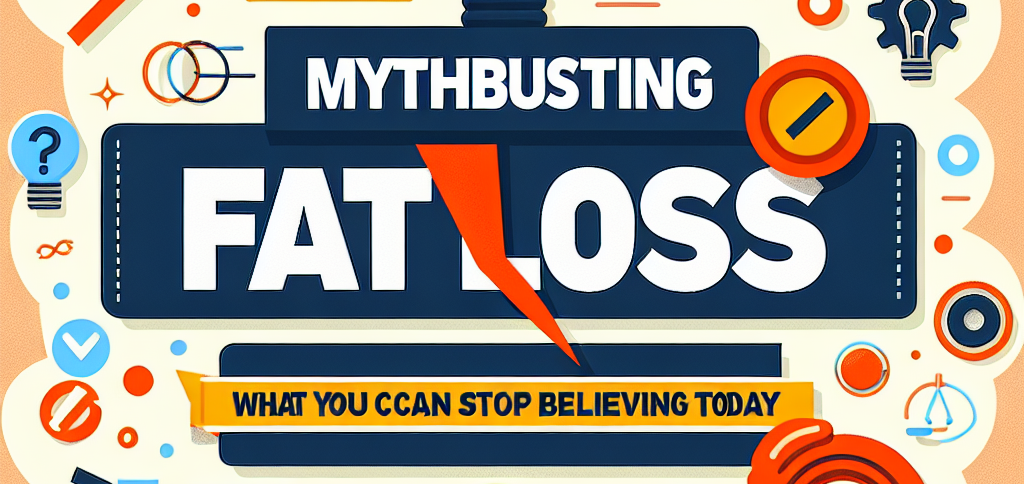Top Fat Loss Myths and Facts: What You Really Need to Know
In an era filled with countless diet plans and weight loss programs, it can be hard to separate fact from fiction. Myths about fat loss not only create confusion but can also lead to ineffective or even harmful practices. This listicle will debunk the most common fat loss myths and present evidence-based facts to help you achieve your weight loss goals in a healthy manner.
-
Myth: Spot Reduction Works
Fact: The idea of spot reduction—that you can lose fat in a specific area of the body through targeted exercises—is a persistent myth. Scientific studies show that while targeted exercises can strengthen muscles in specific areas, they don’t specifically burn fat there. Fat loss tends to occur more evenly across the body. To effectively lose fat, focus on overall body fat reduction through a balanced diet and regular exercise.
-
Myth: Eating Fat Makes You Fat
Fact: Not all fats are created equal. Healthy fats, like omega-3 fatty acids found in fish, nuts, and avocados, are essential for the body to function properly. While consuming excessive calories, regardless of the source, can lead to weight gain, healthy fats are an important part of a balanced diet and can actually aid in weight loss through better nutrient absorption and satiety.
-
Myth: You Need to Cut Carbs Drastically to Lose Fat
Fact: Carbohydrates are a vital energy source for your body. While reducing refined carbs can help with weight loss, completely cutting out carbs is unnecessary and unsustainable for most people. Whole grains, fruits, and vegetables provide essential nutrients and should be included in a healthy diet. Focus on quality rather than eliminating entire food groups.
-
Myth: Skipping Meals Will Help You Lose Weight
Fact: Skipping meals can lead to overeating later in the day and may result in a slower metabolism. Regular, balanced meals help regulate your appetite and improve energy levels. Rather than skipping meals, consider eating smaller portions more frequently to maintain a steady energy supply and support metabolic health.
-
Myth: All Calories Are Equal
Fact: While it’s true that calorie balance affects weight gain or loss, not all calories are identical in terms of nutrition and how they affect your body. Nutrient-dense foods like vegetables, fruits, and lean proteins provide the energy and nutrients you need without the extra calories that processed, sugary foods offer. Focusing on the quality of calories can lead to healthier eating habits and effective fat loss.
-
Myth: Exercise Alone Will Result in Significant Fat Loss
Fact: While exercise is crucial for overall health and can aid in weight loss, relying solely on physical activity without modifying your diet may not lead to substantial fat loss. Combining a healthy, balanced diet with regular exercise yields the best results. Moreover, exercise offers numerous other health benefits, such as improved cardiovascular health and mood enhancement.
-
Myth: Drinking Water Will Directly Burn Fat
Fact: While water itself doesn’t directly burn fat, it does play an essential role in weight loss. Staying hydrated can boost metabolism, reduce hunger, and improve digestion, aiding in weight management. Replace high-calorie, sugary drinks with water to cut unnecessary calories and support your overall weight loss efforts.
-
Myth: You Must Eat Breakfast to Stimulate Weight Loss
Fact: The importance of breakfast has been overstated in some cases. What matters more is the quality and timing of your meals throughout the day. While eating breakfast can be beneficial for some, others may find success with intermittent fasting, where the first meal of the day is delayed. Listen to your body and observe what eating patterns work best for you.
-
Myth: Supplements Are Necessary to Burn Fat
Fact: Although certain supplements claim to promote fat loss, they are often unnecessary for those who are following a healthy diet and regular exercise routine. Supplements may support your regimen in some cases, but they are not miracle pills. Consult a healthcare professional before adding any supplement to your regimen.
-
Myth: Weight Loss Is a Linear Process
Fact: Weight loss often involves fluctuations. It’s common to experience periods of rapid weight loss followed by plateaus. Temporary increases in weight are also normal, due to factors like water retention. Consistency and patience are key. Over time, healthy habits will yield results.
Understanding the truth behind these myths can set the stage for sustainable and effective fat loss. A healthy lifestyle that incorporates a balanced diet, regular exercise, and adequate rest is the proven path to weight loss success.
If you’re looking for additional guidance and resources to help you on your weight loss journey, Click Here to learn more. This resource offers insightful tools and strategies that can support you in achieving your weight loss goals sustainably.
In conclusion, separating fat loss facts from myths can empower you to make informed decisions about your health and well-being. Always consider scientific evidence and think critically before adopting any new diet or exercise program.






